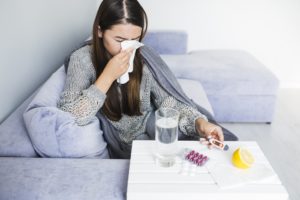What is Flu?
An average of 8% of the US population gets sick with the flu annually, per the Center for Disease Control and Prevention (CDC) in their 2018 study published in Clinical Infectious Diseases. The flu or influenza is a highly infectious respiratory disease that is caused by influenza viruses that target the nose, throat, and lungs. The 2017-2018 flu season had the highest recorded influenza burden in the United States; 45,000,000 people were infected, 810, 000 people were hospitalized and 61,000 individuals died from the flu. Here are some helpful ways that can protect yourself and others from getting infected:
How to prevent Flu?
-
Get Vaccinated.
Seasonal Flu shots vary depending on the flu viruses that are believed to be common during a specific flu season. According to the CDC, the vaccines trigger antibodies in the body that provide protection against the strains of flu infection contained in the vaccine. The CDC states that receiving an annual vaccination is the single best way to prevent seasonal flu, but practicing good proper hygiene and healthy habits can help a lot on how to prevent flu and contracting other viruses aside from the flu.
-
Avoid close contact.
Keep at least three to six feet away from anyone who’s coughing or sneezing. According to the CDC, flu viruses spread by tiny droplets made when people cough, sneeze or talk which may land on your mouth or nose or on surfaces nearby. If you are sick with the flu, it is better to stay at home and recuperate to avoid infecting other people. Wear a mask and cover your mouth and nose when sneezing to prevent the spread of germs and viruses that may carry illnesses.
Avoid sharing things with infected people like a drink, plate or eating utensils. The flu virus is highly contagious from the day you experience your first symptom and after a week the symptoms subside. Keeping infected people in mild isolation for recuperation in homes will be most beneficial for you and other people to avoid the spread of the virus.
-
Keep your hands clean.
Clean hands can save lives. Remember to wash your hands after handling commonly-touched surfaces using soap and water or a sanitizer with at least 60% alcohol. According to CDC’s best practice in washing hands, lather for at least 20 seconds, then rinse and dry with a clean towel. You can risk transferring the virus to yourself if you touch a contaminated surface and touch your face afterward. Wear gloves and mask if you’re taking care of someone who has the flu and wash your hand if you’re going to run an errand to avoid the spread of the virus.
-
Strengthen your immune system
People who get vaccinated can still catch the flu, but lesser and milder symptoms. In order to strengthen your protection against the flu, maintaining a healthy immune system is the key. The immune system helps protect your body from infections and viruses such as the flu. It launches an attack on threats almost immediately when it is functioning properly. By implementing a healthy lifestyle, both your body and immune system benefit greatly. Here are some ways you can strengthen your immune system:
- Getting enough sleep.
- Having a fruit- and vegetable-rich diet.
- Daily Exercise.
- Reducing Stress.
- Taking vitamin supplements.
-
Stop Smoking
One of the flu prevention tips that not only benefits you but your children, family or anyone else that lives with you is quitting smoking. Smoking affects the immune system. Smokers have an exaggerated response to viruses according to a study conducted by researchers of Yale School of Medicine published under the American Society for Clinical Investigation. It was revealed that smokers are more likely to die during flu epidemics than nonsmokers. The findings show that smokers have a severe reaction to the flu not because they can’t fight it off, but because their immune system overreacts to the virus as it enters their system. Research from the University of Rochester Medical Center in New York also revealed that children who are exposed to second-hand smoke may need intensive care and longer hospital stays when infected by the flu.
Bottomline
Getting sick with the flu should never be taken lightly. Talk to Dr. Amy Schiffman. She is a board-certified allergist and immunologist in Boca Raton, Florida.

